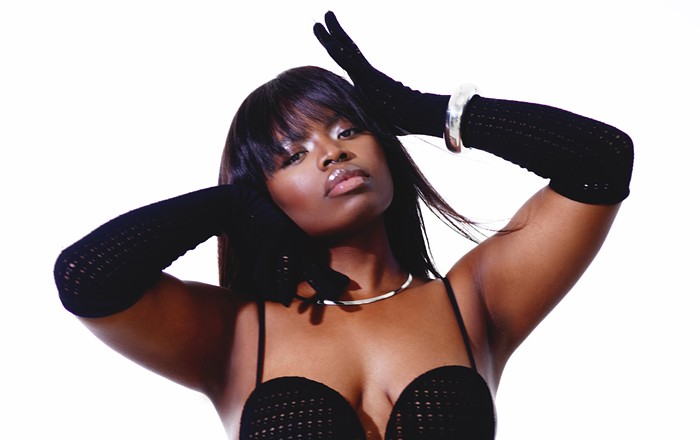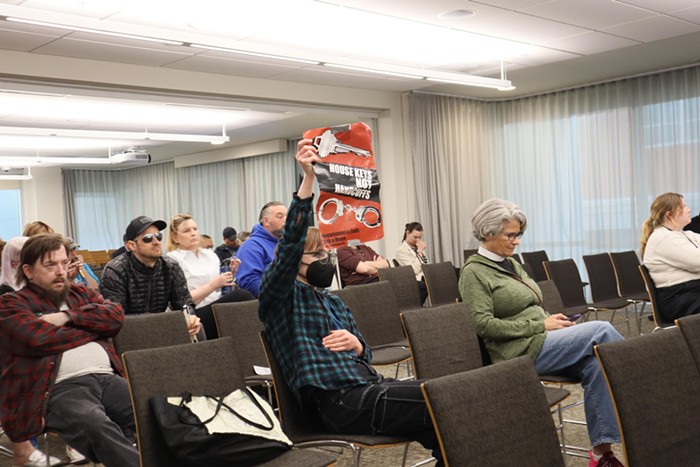DAN BEJAR is preparing for Destroyer's upcoming tour, which begins this Friday in Portland. "Tonight is our first practice, which should be interesting," he says over the phone. "The band really hasn't been in the same room together since we recorded the new songs and that was quite a while ago.
"It's going to be trial by fire," Bejar adds. "That's mostly what I do."
Indeed, for nearly 20 years and 10 albums under the Destroyer name, Bejar has been flinging syllables and sounds at the wall and seeing what sticks. While his dense, literary flights of lyrical fancy and Destroyer's sprightly arrangements may suggest great deliberation, Bejar is actually propelled by spontaneity, preferring to fly by the seat of his pants.
"I'm not too nervous about it," he says of the evening's practice. "Because of the nature of the way the new songs went down, it all happened pretty natural and fast... so actually I'm more just excited about putting the set together."
The instrumentation for Destroyer's just-released album, Poison Season, leans heavily on a classical quintet. Will there be strings on stage?
"That's a good question," Bejar says. "We're going to have to tackle that." Laughing, he asks: "What do you think we should do?
"I guess tonight is going to be the night where we decide what approach to take. We kind of have a fondness for taking Destroyer recordings and just completely contorting them to suit our whims."
Poison Season came together in a similarly ramshackle, see-what-sticks fashion. After writing basic lyrical outlines and melodies, Bejar convened his longtime band. They rehearsed for three or four days before spending just two in the studio. Along with the foundation of the songs—guitars, bass, drums, and so on—Bejar sang live with the band on the studio floor.
"It was the only time I've ever done that," he says. "And having done it once I think there's no going back... I want to say that [old] version of Destroyer now seems dead to me.
Of sticking with the one live take, Bejar says, "It took me a while to warm up to it. I would hear a lot of imperfections—maybe imperfection isn't the word, but little moments that you would want to go back and change. But the overall feeling of the performance seemed like something that I couldn't match."
Altering the process, however, was only the beginning for Bejar, whose catalog is filled with a relentless appetite for stylistic exploration. In amalgamating wistful, 20th-century orchestral crooning, Poison Season fits right into Destroyer's ever-unfurling oeuvre.
"I was listening to sad, slow songs, the kind of jazz standard repertoire," he says. "And I found that I went from fandom to having those things kind of creep into the actual phrasings that I was coming up with, and the chord choices. And I ran with it because I love that stuff. It's the bulk of what I've been listening to in the last couple years."
In following that thread, Poison Season afforded Bejar another first: the opportunity to work with a proper string quintet. (After the success of 2011's Kaputt, Bejar's recording budget nearly tripled.) "In my mind I had already built up the presence of the strings, so that was kind of a make-or-break thing for the record," Bejar says. "It also felt very much out of my control, because it happened very fast."
Unlike his Destroyer bandmates, with whom he'd developed close relationships over the past decade, a chasm—technical and social—separated Bejar from the hired musicians. "They were, like, classically trained union people who showed up for a four-hour recording session and have no idea who you are and kind of don't really care," he says. "They're total strangers and they're working off charts."
For the most part, Bejar stayed out of the way while they played, although he recorded the orchestral version of "Times Square" live on the floor as he had with the band. At times, the two outfits—veteran band and string quintet—intertwine via overdubs.
"I think I definitely had '70s espionage music, or chase music, or crime music in my mind," Bejar says. "I think those things stuck in at least two or three songs, which have elements of that. It's kind of like an urban '70s vibe." Such inspiration is most evident in the orchestral crashes and racing bongos of "Midnight Meet the Rain," and in the string-heavy passages of "Forces from Above."
Taking Poison Season as a whole, moving from one song to the next can be jarring—a juxtaposition Bejar intended. "Something about the record made me think it should be uneasy and depressing, but still romantic," he says. "I thought that [the songs] were going to sit together in a way that would be really cool, but you were going to have to embrace a certain kind of schizophrenic element.
"I thought it was really cool and exciting," he continues. "It was an idea that I had, and when you put it into practice you don't really know how it's going to turn out."
However, when it comes to bringing more musicians on stage to replicate the strings from Poison Season, Bejar finally knuckles down.
"There's eight of us," he says of the current band. "I think to get 12 or 13 people would truly be the end of me."



















